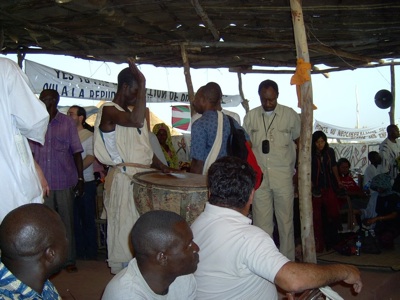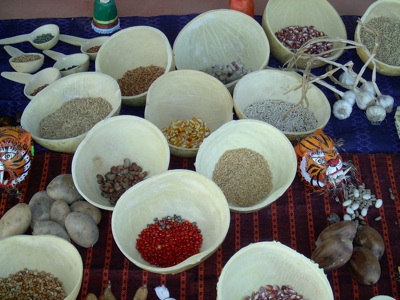Nyeleni’s Spirit Comes Through Strong on Opening Day of Forum
Nyeleni’s persistent spirit is coming through.
We now have electricity and running water. Getting internet is unlikely. These blogs are traveling from Sélingué (via portable USB flash drive) 2.5 hours to Bamako where there is one internet café. An organizer sits there waiting for material to upload on the Nyeleni website.
Today was the opening, inaugural ceremony.
We heard from the mayor of Sélingué, the women’s representative of the village and the advisor to the village leader. They welcomed us and asked us to consider Mali our home. “We may not have the comforts that you are used to but there is no lack of human warmth here.” After a lyrical presentation by a Malian singer and children, the President of CNOP (National Coordination of Peasants of Mali), the host organization, set the scene for the hard work we are here to do. “Food sovereignty,” he said, “is the only valid struggle in the world today.” He reasoned that you could lose everything in the world but not your food. “Food sovereignty,” he insisted, “is a political imperative that we must demand of the rest of the world.”We then heard testimonies from farmers, indigenous peoples, fish harvesters, and pastoralists from all regions of the world describing how their food sovereignty is being assaulted.

A woman from ROPPA (Network of Peasants and Producers of West Africa), said that they are being asked to compete with large producers. “Peasants in West Africa are not ready for this competition. We don’t want unfair competition in our sector.”
From Brazil, a woman representing the MMC (Peasant Women’s Movement), called for the development of an alternative mode of production in our society.
A U.S. fisherman representing the World Forum of Fish harvesters and Fish workers, said that “food production is the work of our hearts and hands.” He gave two examples: in Indonesia following the tsunami, the fisherfolk lost everything and it was the fisherfolk and farmers from around the world that came to help those who lost their livelihoods (before international aid reached them); in Louisiana and Mississippi, after hurricane Katrina, the fishermen and farmers lost everything too and the farmers and fishers came to help (again, before the government aid arrived). He said, “If we could do this, then we can achieve food sovereignty with our hearts and hands.”
A nomadic pastoralist from Africa talked about drought and climate change. She noted that, “we nomadic pastoralists are the among those most affected by drought and climate change.”
From Southeast Asia, a man representing Thai peasants said that food sovereignty is a political issue that involves agrarian reform and the control of resources.

A Lebanese farmer described how conflict (as defined by governments) and war (as he believes it should be called) affect food sovereignty. He pointed out that in the Occupied Palestinian Territories, the Separation Wall is taking 45% of agricultural land from Palestinian farmers. Farmers are not allowed to go to market. He explained that the systematic eradication of the agricultural life of the Palestinians is destroying the life of the Palestinian people. In Lebanon, the recent war led to devastating crop loss (e.g., 70% of citrus production was lost) that will take at least 15 years to recover.
There is a lot of work to be done! We will be working in several thematic working groups over the next few days that will attempt to tackle ‘what are we fighting against?’, ‘what are we fighting for?’ and ‘what do we want?’
One thing is for sure, today’s testimonies touched the hearts of everyone here. As the CNOP president said, “the only struggle worth fighting for is food sovereignty.”
I believe Nyeleni’s spirit will carry us there.
